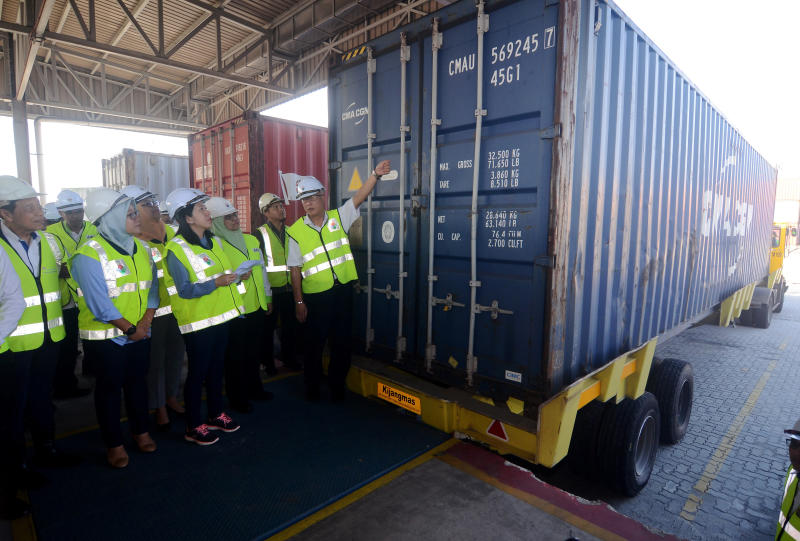Malaysia returns 150 containers of plastic trash to countries of origin
Sign up now: Get insights on the biggest stories in Malaysia

Malaysia's Energy, Science, Technology, Environment and Climate Change Minister Yeo Bee Yin (front row, third from left) inspects a container filled with plastic waste that will be sent back to its country of origin at Penang Port on Jan 20, 2020.
PHOTO: BERNAMA
KUALA LUMPUR - Malaysia has begun the arduous diplomatic process of returning thousands of tonnes of illegal plastic trash to their exporting countries, amid ongoing operations at the three main ports of Klang, Penang and Sarawak.
"The government of Malaysia is taking stern action to combat the illegal movement of plastic waste into Malaysia by stopping the movement at the source, which is at the ports," Energy, Science, Technology, Environment and Climate Change Minister Yeo Bee Yin told a news conference at Penang Port on Monday (Jan 20).
"To date, the government of Malaysia has repatriated 150 containers of illegal plastic waste with approximately 3,737 metric tonnes," she added.
The plastic waste did not have import permits and did not meet the criteria for importing plastic waste under the Basel Convention on Transboundary Movements of Hazardous Wastes and Their Disposal.
Malaysia has been working on repatriating the containers since last year, and officials described it then as an uphill task, as the exporting countries would not accept them.
They also said they struggled to identify the country of origin of the containers, as many lay abandoned at the ports. Local Housing and Government Minister Zuraida Kamaruddin in August suggested that incineration may be the best way to clear the waste, as some of the exporting countries were not party to the Basel Convention and would not take them back.
But these issues appear to have been ironed out, with even the exporters or shipping companies agreeing to foot the bill.
"The repatriation exercise does not incur any cost to the government of Malaysia. The costs were either borne by the exporters or shipping liners," Ms Yeo told the news conference.
Two countries accounted for more than half the number of containers - France (43) and Britain (42).
They were also exported from the United States (17), Canada (11), Spain (10), Japan (five) and Singapore (four).
The rest were from Portugal, China, Bangladesh and other countries.
Malaysia is also in the process of returning another 110 containers still at its ports while it prepares to launch a National Action Plan for the Importation of Plastic Waste in February.
The breakdown of the 110 containers and their respective countries of origin are: US (60), Canada (15), Japan (14), Britain (nine), Belgium (eight), and one each from Mexico, Hungary, France and Jamaica.
"For Malaysia, we do not want to pay a single sen because it is not about money, it's about dignity. People dump their rubbish into your country, you are not supposed to pay them to send it back. No matter how difficult, we are going to send them back and we are going to make people who export here, and the shipping liners to pay for it," said Ms Yeo.
She added that a total of 393 plastic recycling factories were inspected last year and 218 were shut down for not following regulations.
After China banned the import of plastic waste at the start of 2018, Malaysia quickly became the top destination for global exports, mostly from richer developed nations such as the US, Germany, Britain and Japan who were keen to get rid of material that was costly and troublesome to dispose of.
Illegal, often contaminated, plastic waste were sent in shipments that were mixed with genuine recyclable plastic.
Last year, Ms Yeo revealed that many illegal importers were making "false declarations" to customs, filling the front of the container with recyclable material while stuffing illegal waste at the back, thus escaping scrutiny.
Imports into Malaysia rose steadily from 20,000 tonnes per month at the beginning of 2017 to 110,000 tonnes per month in early-2018.


